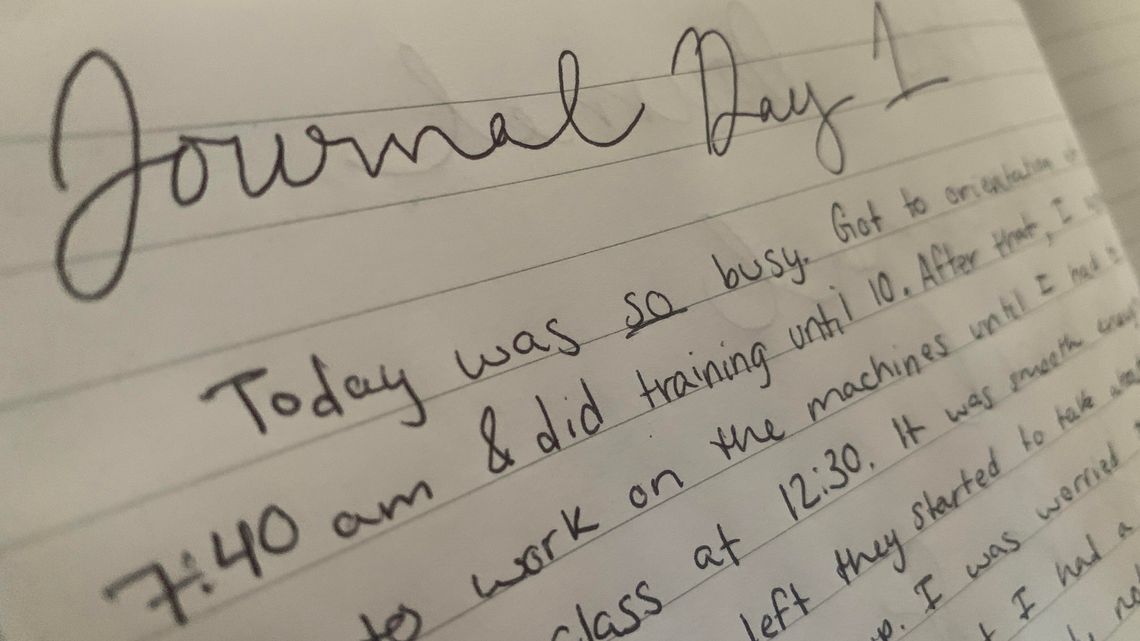BY CAROLINE CRAIN
News Editor
As a child, I had a diary with a voice-activated password — revolutionary technology for its time. Whenever I was feeling down, I would write out my thoughts, scribble “top-secret” information in invisible ink and lock it away as if it held the world’s greatest mysteries.
Fast forward to my late teens, and my view on journaling had soured. When an online therapist suggested I try it to work through what I thought was a quarter-life crisis, I scoffed.
“How is that supposed to help me?” I thought. “I want you to tell me how to fix my problems, not just write them down.”
At the time, I saw journaling as another unproductive task eating away at the limited hours in my day.
Recently, however, I decided to give it another chance. I set out to journal for a week and see if it made any difference in my stress levels and overall mental clarity.
Over seven days, I committed to recording my thoughts. I documented my experiences, emotions and the little wins of each day. While I didn’t expect it to change my life, I hoped it might offer some insight.
The first day, I recapped my schedule, which included work orientation, homework and a long shift at my other job. I also wrote about my frustration with my sister’s attitude, then questioned if I was overreacting. By the end, I wasn’t sure if journaling helped, but it gave me an outlet to put down what I couldn’t say out loud.
The second day, I was exhausted but documented a rock climbing trip for a class. I noticed a divide forming in a friend group and stressed about the growing list of things I needed to finish before spring break.
“Thinking of everything I need to do in such a short time frame is stressing me out,” I wrote. “Writing down that it’s stressing me out doesn’t feel like much consolation, but I don’t know.”
By the third day, I was too tired to write, so I recorded an audio journal. I took a midterm, worked out, had an interview and wrote a paper. Despite my canceled classes, it was still a packed day. That night, I drove home to help feed my parents’ animals while they were away. It was also my sister’s birthday, and a bakery in my hometown gave me a free treat to give to her.
On the fourth day, I recorded another audio journal. I attended a math department event for Pi Day and witnessed professors get pied in the face, which felt like a rare moment of lighthearted fun in a busy semester. I also finished a major project after weeks of work. It was the last thing standing between me and spring break.
After these two days, I found audio journaling to be a better outlet for me since it felt more natural and less of a chore than writing —it was almost like a personal vlog or a phone call with myself. I stuck with this method for the rest of my experiment.
The next two days, I started a new job. The first day went well, and the second felt a little longer, but I didn’t mind the work. That night, my cousin came over to get ready for a trip we had planned.
The seventh day was the first day of vacation, filled with road trips, an aquarium visit and a walk on the beach.
By the end of the week, I noticed subtle changes in my perspective. Writing down my thoughts didn’t erase my stress, but it made it easier to process.
Research has found similar effects. According to the University of Rochester Medical Center, journaling can help manage anxiety and reduce stress by allowing people to express their emotions in a structured way.
Another study, published by the Cambridge University Press, found that expressive writing can also improve physical health. Participants who wrote about their thoughts and emotions for 15 to 20 minutes daily showed lower blood pressure and improved immune function.
After a week of journaling, I didn’t find all the answers to my problems, but I saw the value in taking a few moments to reflect. Journaling may not be a one-size-fits-all solution, but it can offer real benefits. Give it a try for a week, make it your own and see if it works for you — it’s a simple tool that could make a difference.
.png)

Comment
Comments